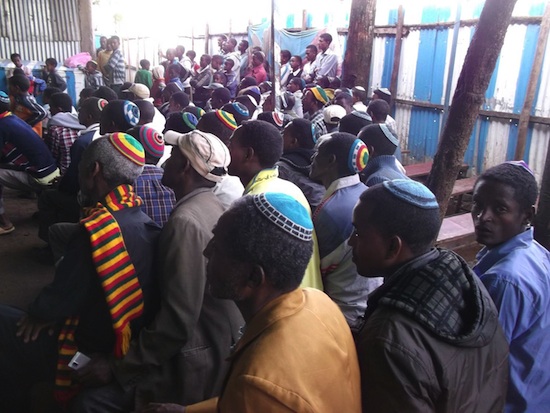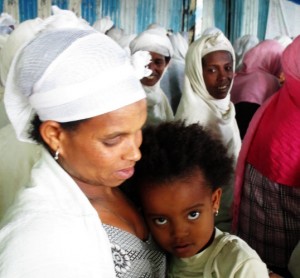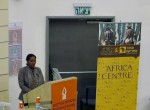Last August, 450 new olim made the five-hour flight from northwest Ethiopia to their new home: Israel. According to those on hand to meet the new immigrants when they landed at Ben-Gurion Airport, the passenger roster for that hot August day constituted the last remaining members of Ethiopia’s ancient Jewish community, known as the Falashmura, or Beta Israel.
“The last group of the Jewish community of Ethiopia just stepped down from their plane,” said Eliezer Zandberg, as Israel’s newest immigrants joined weeping and elated relatives in the airport. Zandberg is the chairman of Keren Hayesod, or United Israel Appeal, which helped coordinate the aliyah of the Beta Israel. “This is the excitement, this is the whole story – returning to their homeland.”
While news agencies reporting on this aliyah assumed that the final leg of Operation Dove’s Wings last August carried Ethiopia’s last Jews, many aid groups remain adamant that the aliyah is not yet over. In the past five months, relief agencies, family members, advocates and rabbis from Israel and abroad have been calling on the Israeli government to return to Ethiopia and process the family members that have been left behind in two Jewish communities, Addis Ababa and Gondar. Both communities are located in northwest Ethiopia, and have been central receiving points for Ethiopian Jews hoping to make aliyah. According to several aid organizations that have recently been in Gondar, there are as many as 7,000 Jewish descendants that should have qualified for aliyah – many of whom are direct relatives of newly accepted olim in Israel.
On Jan. 1, 2014, while the rest of the world celebrated a new year, advocates for those remaining 7,000 got down to work. In Israel, members of the advocacy group Struggle for the Aliyah of Ethiopian Jewry (SAEJ) hosted a convention on the grounds of Ben-Gurion University in Be’ersheva. Some 200 members of Israel’s Beta Israel community, new immigrants and three members of the Knesset were there to discuss what has been termed a continuing humanitarian issue. A second convention was held a two days later in Tel Aviv, hosted by the relief organization South Wing to Zion, which was founded by Ethiopian human rights activist, Dr. Avraham Negusie. The mandate of both conventions was to highlight the needs of Ethiopian Jewish family members still waiting for aliyah approval.

(photo by Uri Perednik)
According to Uri Perednik, who helped found SAEJ and helped organize the convention in Be’ersheva, MKs Pnina Tamano-Shata, Hilik (Yehiel) Bar and Shimon Solomon were briefed on the status of the remaining applicants in Ethiopia, and the events that have occurred since the August airlift. After members of the Ethiopian community in Israel staged a protest in front of Prime Minister Binyamin Netanyahu’s office on Aug. 28, the Knesset absorption committee agreed to look into reopening the aliyah for outstanding family members, Perednik said in an interview from his home in Israel. However, he added, there has been little resolved by the government, and members of Israel’s Beta Israel community are becoming increasingly frustrated.
Since the convention, all three MKs have called for the aliyah to be reopened, according to a statement released by SAEJ. Tamano-Shata has offered to forward a petition to the minister of interior, Gideon Sa’ar, while Bar and Solomon have vowed to pressure the government to admit the remaining family members.
“There is no doubt in the [Ethiopian Jewry’s] Judaism because their family is here in Israel,” said Bar. He expects an appeals committee will review the outstanding cases. “The committee will begin to check these cases, examine the paperwork, understand that [there] was a serious mistake here and finish this terrible saga.”
Perednik noted that records maintained by the Jewish community in Addis Ababa indicate that 415 community members have already died waiting for their aliyah papers to be approved. Since the Jewish community in Gondar is much larger than in Addis Ababa, he said, “the number of deceased [in Gondar] may be twice as big.”
“The Israeli government encouraged these families to leave their homes and villages in order to realize their dream of returning to the Holy Land,” wrote Perednik in his Times of Israel blog, referring to Israel’s initial efforts to rescue persecuted Ethiopian Jews in the 1980s. The Beta Israel of today “are members of active Jewish communities whose religious lives revolve around their synagogues, who maintain laws of family purity with their mikvahs, and who attend classes on Judaism, and are nonetheless alienated by the establishment.”

(photo by Rabbi Sybil Sheridan)
Some aid groups charge that the poverty and unemployment in Ethiopian Jewish communities are directly related to their nebulous immigrant status. “The situation is worse than most [for] most Ethiopians” in their cities, Perednik explained. He said the government’s encouragement for them to seek aliyah meant that they were forced to sell their property and quit their jobs in order to come to the cities in which they now live.
“About 80 percent of the people in these communities have family in Israel. I know many cases here in which there could be almost an entire family [living] in Israel – the mother, the father, brothers and sisters, and one sister or one brother is left behind. Or you could have all the children here [in Israel] and the parents left behind. Many of these people in Israel, brothers and sisters, are in the army and grew up in Israel, feel Israeli and Jewish.”
At the heart of the issue concerning the families’ immigrant status is the question of their Jewish ethnicity. In 2003, the government mandated that all future Beta Israel immigrants must be able to show matrilineal ancestry. Prior to that date, Beta Israel immigrants who could show either matrilineal or patrilineal heritage were eligible.
The problem with the change in the ruling, said Hila Bram, co-founder of the London-based relief organization Meketa, is that traditional Ethiopian Jewish communities still follow the patrilineal Jewish ancestry, and have done so for thousands of years. Patrilineal heritage is believed to have been common in early biblical times, and many of the cultural traditions of ancient Ethiopian Judaism are distinct from those followed by Ashkenazi, Sephardi and Mizrahi Jewish communities.
“The Jewish state has turned around and said we take you by the religion of your mother, whereas Western Judaism until the second century and Judaism in Ethiopia until now, take you [as Jewish] by your father,” Bram explained in an interview from her residence in England. “And that has really added to the confusion and to the problematic nature of all of this for Ethiopian Jews. By their society, you are the religion of your father, who is the head of the household.”
According to both Perednik and Bram, the cessation of Jewish Agency services on Aug. 28 meant the closure of all religious and educational services in Gondar, as well. Perednik said the remaining community members were devastated by the closure of the synagogue, given that it is used daily. Since the closure, the Ethiopian Jewish organizations Hatikvah and South Wing to Zion have stepped forward to raise the rental costs to keep the synagogue open. The Torah, which had been removed by the Jewish Agency, was later returned with Negusie’s assistance. The Jewish school has not been reopened. Students have been transferred to public schools, where there is no provision for Jewish education.
Since the Jan. 1 convention, effort has been stepped up by Beta Israel community members to convince the Israeli government to review the situation in Ethiopia. In December, an appeals committee visited Gondar to assess the situation, but the trip was delayed by snowfall in Israel, and Bram said that the team had only one day to assess the situation. The report is not due to be released for another month or two.

(photo by Rabbi Sybil Sheridan)
SAEJ released a statement last week calling on the government to increase the immediate powers of the appeals committee and to accept those applicants who meet the following criteria: “They are descendants of Ethiopian Jews from [either] their mother or their father; they left their villages and have been waiting for years in Addis Ababa and Gondar; [they were] listed earlier with the Ministry of Interior; they live as Jews; and they have close relations in Israel: parents, children, brothers, sisters.”
The committee also made a formal appeal that the government change the terminology it uses concerning community members in Ethiopia. “[The] committee is protesting the government[’s] use of the derogatory name Falashmura.” The ancient name was ascribed to the community by non-Jews hundreds of years ago, and implies in polite context one who is a “stranger.” The community has elected the name Beta Israel, meaning “Children of Israel,” for members of the Ethiopian Jewish community in Israel who were granted aliyah earlier, and Zara Israel (Descendants of Israel) for those who are descendants of the original community and are awaiting aliyah.
Jan Lee’s articles have been published in B’nai B’rith Magazine, thedailyrabbi.com and Voices of Conservative and Masorti Judaism. She also writes on sustainable business practices for TriplePundit.com. Her blog can be found at multiculturaljew.polestarpassages.com.

